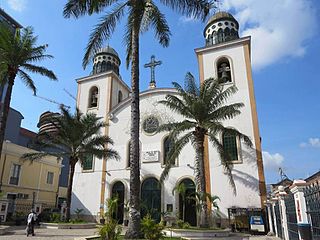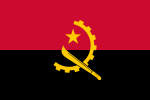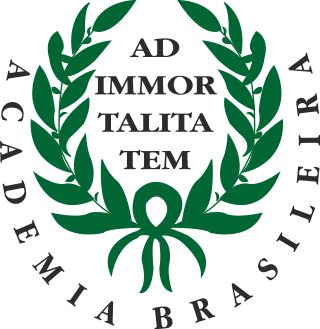The International Dublin Literary Award, established as the International IMPAC Dublin Literary Award in 1996, is presented each year for a novel written or translated into English. It promotes excellence in world literature and is solely sponsored by Dublin City Council, Ireland. At €100,000, the award is one of the richest literary prizes in the world. If the winning book is a translation, the prize is divided between the writer and the translator, with the writer receiving €75,000 and the translator €25,000. The first award was made in 1996 to David Malouf for his English-language novel Remembering Babylon.

Kizomba is a dance and musical genre that originated in Angola in 1984.

Brazilian literature is the literature written in the Portuguese language by Brazilians or in Brazil, including works written prior to the country's independence in 1822. Throughout its early years, literature from Brazil followed the literary trends of Portugal, gradually shifting to a different and authentic writing style in the course of the 19th and 20th centuries, in the search for truly Brazilian themes and use of Brazilian forms.
José Luandino Vieira is an Angolan writer of short fiction and novels.

José Eduardo Agualusa Alves da Cunha is an Angolan journalist and writer of Portuguese and Brazilian descent. He studied agronomy and silviculture in Lisbon, Portugal. Currently he resides in the Island of Mozambique, working as a writer and journalist. He also has been working to establish a public library on the island.
African literature is literature from Africa, either oral ("orature") or written in African and Afro-Asiatic languages. Examples of pre-colonial African literature can be traced back to at least the fourth century AD. The best-known is the Kebra Negast, or "Book of Kings."
Latin American literature consists of the oral and written literature of Latin America in several languages, particularly in Spanish, Portuguese, and the indigenous languages of the Americas. It rose to particular prominence globally during the second half of the 20th century, largely due to the international success of the style known as magical realism. As such, the region's literature is often associated solely with this style, with the 20th century literary movement known as Latin American Boom, and with its most famous exponent, Gabriel García Márquez. Latin American literature has a rich and complex tradition of literary production that dates back many centuries.

Portuguese Angolans are citizens of Angola who are either descended from Portuguese people or Portuguese emigrants permanently living in Angola. The number of Portuguese Angolans precipitously dropped during and immediately after the Angolan War of Independence, but several hundreds of thousands have either returned or emigrated to live in Angola. As of 2022, they make up approximately 0.6% of Angola's population.

Angola–Brazil relations are the bilateral relations between Angola and Brazil. As former Portuguese colonies, Angola and Brazil share many cultural ties, including language and religion. Both nations are members of the Community of Portuguese Language Countries, Group of 77 and the United Nations.

Daniel Hahn is a British writer, editor and translator.
Luuanda is a book by the Angolan writer José Luandino Vieira published in 1963 by Edições 70 in Lisbon, Portugal; an English translation by Tamara L. Bender was published by Heinemann in 1980. The book is a collection of three stories, "Grandma Xíxi and Her Grandson Zeca Santos," "The Tale of the Thief and the Parrot," and "The Tale of the Chicken and the Egg."
The José Saramago Literary Prize has been awarded since 1999 by the Círculo de Leitores Foundation to a literary work written in Portuguese by a young author in which the first edition was published in a Lusophone country. It celebrates the attribution of the Nobel Prize in Literature in 1998 to the Portuguese writer José Saramago. The prize has a biannual periodicity, and a monetary value of €25,000. The jury is composed of between five and ten members holding distinguished cultural roles.

The Centre for Lusophone and European Literatures and Cultures of the Faculty of Letters, University of Lisbon (CLEPUL) is a research unit of the University of Lisbon based on the Faculty of Letters of the University of Lisbon. CLEPUL was founded by Jacinto do Prado Coelho after the Carnation Revolution, at the time with the designation of Centre for Portuguese Literatures of the Universities of Lisbon. Its main purpose is the promotion and research on literatures and cultures of the Lusophone countries.

Maria Cremilda Martins Fernandes Alves de Lima is an Angolan children's book author.
Manuel Ferreira was a Portuguese writer that became known for his work which was centered around african culture and literature.

A General Theory of Oblivion is a 2012 novel by Angolan author José Eduardo Agualusa.
Mozambican literature refers to the body of written works produced in Mozambique or by Mozambican authors This literature has been shaped by the country's diverse cultures and tumultuous history, including colonialism, independence movements, and civil war. Since Mozambique was part of the Portuguese colonial empire until 1975, there are inevitable overlaps with Portuguese literature. Mozambican literature is very young, as one can only speak of Mozambican national literature in the narrower sense since independence from Portugal in 1975.










